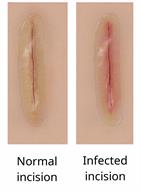Laparoscopic Heller Myotomy, Care After
After a laparoscopic Heller myotomy, it's common to have:
Some discomfort when you swallow.
Soreness in your belly.
Bloating. This is a full, tight, or painful feeling in your belly.
Follow these instructions at home:
Medicines
Eating and drinking
-
Follow instructions from your provider about what you may eat and drink.
-
If told, eat only soft foods. These foods include yogurt and ice cream.
Incision care

- Follow instructions from your provider about how to take care of your incisions. Make sure you:
Wash your hands with soap and water for at least 20 seconds before and after you change your bandages (dressings). If soap and water aren't available, use hand sanitizer.
Change your bandages as told by your provider.
Leave stitches (sutures), skin glue, or tape strips in place. These skin closures may need to stay in place for 2 weeks or longer. If tape strip edges start to loosen and curl up, you may trim the loose edges. Do not remove tape strips completely unless your provider tells you to do that.
- Check your incision areas every day for signs of infection. Check for:
Activity
-
You may have to avoid lifting. Ask your provider how much you can safely lift.
-
Go for a walk or be active at least once a day. This can help with bloating.
-
Return to your normal activities as told by your provider. Ask your provider what activities are safe for you.
General instructions
-
Do not use any products that contain nicotine or tobacco. These products include cigarettes, chewing tobacco, and vaping devices, such as e-cigarettes. These can delay healing after surgery. If you need help quitting, ask your provider.
-
Do not take baths, swim, or use a hot tub until your provider approves. Ask your provider if you may take showers. You may only be allowed to take sponge baths.
Your provider may give you more instructions. Make sure you know what you can and can't do.
Contact a health care provider if:
-
Your pain doesn't get better with medicine.
- You have:
-
Your incisions open up.
-
You have any signs of infection.
-
You have trouble pooping, or you poop less often than normal.
-
You have chest pain.
-
You have trouble breathing.
-
There's blood in your vomit.
-
You can't swallow food or drinks.
These symptoms may be an emergency. Get help right away. Call 911.
This information is not intended to replace advice given to you by your health care provider. Make sure you discuss any questions you have with your health care provider.
